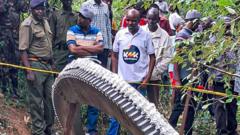In a startling incident that took place recently in Mukuku village, Makueni County, Kenya, local residents experienced a sense of shock and confusion as a massive metallic object plummeted from the skies, creating a loud boom that echoed across the area. According to eyewitness Stephen Mangoka, a 75-year-old farmer, the sound was so unexpected it incited fears of bomb explosions or gunfire, leading him to rush outside for clarification.
Upon investigation, it was discovered that the object, which appeared as a large, hot round metal ring, had landed on farmland. Ann Kanuna, the landowner, noted that the object required hours to cool down before anyone dared approach it. The expected curiosity ensued, with locals flocking to the site to witness the spectacle, taking photos and speculating about its origin.
As crowds gathered, local authorities were notified, and the Kenya Space Agency (KSA) was prompted to investigate. Concern over the potential theft of the object by opportunistic scavengers led villagers to keep vigil overnight, protecting the unusual find from potential looters. Reports indicated the object weighed over 500kg and measured about 2.5m in diameter.
Following the incident, when the KSA examined the object, they determined it was a "separation ring" from a space launch vehicle, typically designed to disintegrate upon re-entry into the Earth’s atmosphere. While no injuries were reported, some villagers expressed concerns about property damage from the impact, with cracks appearing in nearby homes.
Benson Mutuku, a local resident, voiced worries about possible health risks associated with exposure to the metallic debris, echoing fears historically tied to similar encounters with space junk. However, the Kenya Nuclear Regulatory Authority later confirmed that radiation levels were not harmful to the community.
As investigations continued, Brigadier Hillary Kipkosgey emphasized the state's responsibility for any harm caused by space debris. The object, which may have been orbiting Earth since 2008, has sparked discussions on the growing issue of space junk, with more than 6,000 tonnes currently reported in orbit. Similar incidents have been recorded across East Africa, highlighting the need for measures to monitor and manage space debris effectively in the region.
With growing concerns about safety, Mukuku residents are calling for governmental assurances to prevent future incidents.
Upon investigation, it was discovered that the object, which appeared as a large, hot round metal ring, had landed on farmland. Ann Kanuna, the landowner, noted that the object required hours to cool down before anyone dared approach it. The expected curiosity ensued, with locals flocking to the site to witness the spectacle, taking photos and speculating about its origin.
As crowds gathered, local authorities were notified, and the Kenya Space Agency (KSA) was prompted to investigate. Concern over the potential theft of the object by opportunistic scavengers led villagers to keep vigil overnight, protecting the unusual find from potential looters. Reports indicated the object weighed over 500kg and measured about 2.5m in diameter.
Following the incident, when the KSA examined the object, they determined it was a "separation ring" from a space launch vehicle, typically designed to disintegrate upon re-entry into the Earth’s atmosphere. While no injuries were reported, some villagers expressed concerns about property damage from the impact, with cracks appearing in nearby homes.
Benson Mutuku, a local resident, voiced worries about possible health risks associated with exposure to the metallic debris, echoing fears historically tied to similar encounters with space junk. However, the Kenya Nuclear Regulatory Authority later confirmed that radiation levels were not harmful to the community.
As investigations continued, Brigadier Hillary Kipkosgey emphasized the state's responsibility for any harm caused by space debris. The object, which may have been orbiting Earth since 2008, has sparked discussions on the growing issue of space junk, with more than 6,000 tonnes currently reported in orbit. Similar incidents have been recorded across East Africa, highlighting the need for measures to monitor and manage space debris effectively in the region.
With growing concerns about safety, Mukuku residents are calling for governmental assurances to prevent future incidents.



















